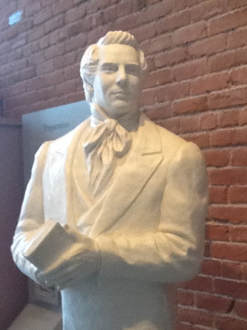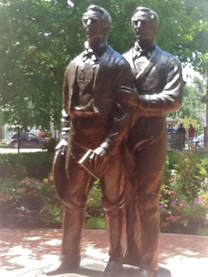
On a blustery April 7, 1844, Joseph Smith stepped to the podium to address the congregation gathered for the general conference. Smith’s friend, Elder King Follett, had died a month earlier from accidental injuries. As Joseph scanned the more than twenty thousand gathered on the banks of the Mississippi, they expected he would eulogize his friend’s tragic death. Smith splayed his arms and said, “May the Lord strengthen my lungs and stay the winds.”

Smith went on to deliver his most important sermon. In Richard Lyman Bushman’s book Joseph Smith: Rough Stone Rolling, he notes that literary critic Harold Bloom called the sermon ‘one of the truly remarkable sermons ever preached in America’. As Smith concluded, the clouds had parted, sun shone on Nauvoo, and the winds had been stayed. Within three months of his eloquence, an angry mob murdered Smith and his brother while they were in a Carthage jail cell.
In The Believers in the Crucible Nauvoo, amid controversy swirling in Nauvoo on 26 May 1844, George Taggart reflected on his prophet’s words delivered earlier. Below is the relevant part of the chapter.
__________________________________________
As George waited to hear from Joseph Smith, he reflected. Several weeks earlier, he had attended a general conference, which occurred shortly after the death of Elder King Follett. Joseph took the occasion to speak about death in general rather than eulogize his friend’s tragic demise. George had hoped for inspiration since at the time he was still grieving his father’s and Oliver’s deaths. He received more, which now replayed as he waited.
On that day, Joseph approached the podium as dark clouds loomed and trees swayed. He gripped his lapels and said. “May the Lord strengthen my lungs and stay the winds.” The leaves continued to flap, yet George heard every word Joseph had said.
“God himself was once as we are now, an exalted man, who sits enthroned in yonder heavens. If the veil were rent today, and God was made visible, you would see him like a man — like yourselves.”
When George first heard those words, he was confused. “How can I or any man become a God?” But as quickly as he had questioned, the Prophet answered.
“When you climb a ladder, you must begin at the bottom and ascend step by step until you arrive at the top; and so it is with the principles of the gospel—you must begin with the first, and go on until you learn all the principles of exaltation.”
As the Prophet continued to expound, George reflected on his life. He had taken his first step toward exaltation when he was baptized, and his father’s and brother’s deaths had brought him higher up the ladder, closer to God. “Am I becoming more Godlike?” He had pondered, still unconvinced and hoping for answers.
“The mortal body has a beginning and an end. Thus, here is your eternal life; to know the only wise and true God. Learn to be Gods yourselves by going from a small degree to another, from grace to grace, from exaltation to exaltation, until you sit in glory with those who sit enthroned in everlasting power.”
As Joseph continued, George had realized mortal existence is brief and the spirit is eternity, a spirit the same as God. As the sermon ended, the clouds had parted, creating darkness on either side of the blue skies above Nauvoo; and the winds had been stayed. As George left, he had an enriched view on living his life - as he was now, God once was; and as God is now, he could be.
Soon after Joseph’s King Follett sermon, the apostates had proclaimed Joseph a fraud saying, “Mortal men becoming Gods is utter blasphemy.” The apostates’ rhetoric continued, and William Law, the most outspoken, accused Joseph of adultery, creating deeper church schisms and fanning anti-Mormon flames. The hullabaloo that followed continued to trouble George.
Now as Joseph arose to speak, George prayed he would respond and vanquish the apostates’ mistruths. Joseph’s stride lacked its usual vigor. His smile seemed contrived. He appeared as beset upon as George was feeling. He didn’t grip the podium with authority, but slouched, using it as a crutch. His opening remarks were barely audible. George feared his Prophet’s recent tribulations had taken their toll. But Joseph cleared his throat, and a vigor came into his voice. . . .
__________________________________________
As George waited to hear from Joseph Smith, he reflected. Several weeks earlier, he had attended a general conference, which occurred shortly after the death of Elder King Follett. Joseph took the occasion to speak about death in general rather than eulogize his friend’s tragic demise. George had hoped for inspiration since at the time he was still grieving his father’s and Oliver’s deaths. He received more, which now replayed as he waited.
On that day, Joseph approached the podium as dark clouds loomed and trees swayed. He gripped his lapels and said. “May the Lord strengthen my lungs and stay the winds.” The leaves continued to flap, yet George heard every word Joseph had said.
“God himself was once as we are now, an exalted man, who sits enthroned in yonder heavens. If the veil were rent today, and God was made visible, you would see him like a man — like yourselves.”
When George first heard those words, he was confused. “How can I or any man become a God?” But as quickly as he had questioned, the Prophet answered.
“When you climb a ladder, you must begin at the bottom and ascend step by step until you arrive at the top; and so it is with the principles of the gospel—you must begin with the first, and go on until you learn all the principles of exaltation.”
As the Prophet continued to expound, George reflected on his life. He had taken his first step toward exaltation when he was baptized, and his father’s and brother’s deaths had brought him higher up the ladder, closer to God. “Am I becoming more Godlike?” He had pondered, still unconvinced and hoping for answers.
“The mortal body has a beginning and an end. Thus, here is your eternal life; to know the only wise and true God. Learn to be Gods yourselves by going from a small degree to another, from grace to grace, from exaltation to exaltation, until you sit in glory with those who sit enthroned in everlasting power.”
As Joseph continued, George had realized mortal existence is brief and the spirit is eternity, a spirit the same as God. As the sermon ended, the clouds had parted, creating darkness on either side of the blue skies above Nauvoo; and the winds had been stayed. As George left, he had an enriched view on living his life - as he was now, God once was; and as God is now, he could be.
Soon after Joseph’s King Follett sermon, the apostates had proclaimed Joseph a fraud saying, “Mortal men becoming Gods is utter blasphemy.” The apostates’ rhetoric continued, and William Law, the most outspoken, accused Joseph of adultery, creating deeper church schisms and fanning anti-Mormon flames. The hullabaloo that followed continued to trouble George.
Now as Joseph arose to speak, George prayed he would respond and vanquish the apostates’ mistruths. Joseph’s stride lacked its usual vigor. His smile seemed contrived. He appeared as beset upon as George was feeling. He didn’t grip the podium with authority, but slouched, using it as a crutch. His opening remarks were barely audible. George feared his Prophet’s recent tribulations had taken their toll. But Joseph cleared his throat, and a vigor came into his voice. . . .

 RSS Feed
RSS Feed
